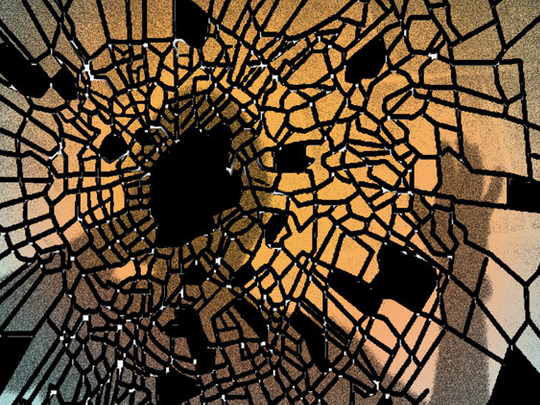
The Scatter Here Is Too Great, by Bilal Tanweer, Harper Collins, 208 pages, $18.29
In Karachi, Pakistan’s seaside commercial capital, nearly 3,000 people died as a result of violent crimes and sectarian violence in 2013. Bilal Tanweer’s timely and unconventional debut novel meditates on the connection between this brutality and the diversity of the city’s inhabitants.
This slim, episodic book is narrated in a multitude of voices and populated by a sprawling cast of characters: absent fathers; superstitious single mothers; brooding sons; a traumatised ambulance driver and a lovelorn teenage girl who invents bittersweet fairytales for her little brother.
The novel doesn’t have a single protagonist, but the ageing communist poet Comrade Sukhansaz makes an appearance in most of its intertwined stories.
Sukhansaz, who abandoned his family in order to pursue his altruistic ideals, served a lengthy prison sentence during the authoritarian reign of General Zia-ul-Haq, a “dog of the CIA” who tortured left-leaning citizens and ruined “the country and this city for his jihad next door”.
One day, the comrade gets on a bus and begins to recite his poetry, and a group of students jeers. He shouts back before disembarking but is soon after killed by a bomb blast at Karachi Cantt station. Sukhansaz’s life and death give the novel a biting political edge. A symbol of Karachi’s secular intellectual past, he is the victim of a deadly combination of United States foreign policy and religious extremism.
The Cantt station bombing is the event that binds the novel’s disparate narrative threads, and this device makes it feel strained in places, such as in a section entitled “To Live”, in which the comrade’s grandson steals his mother’s car for a seaside tryst. Glib aphorisms, too, are a burden, and the prose poems that preface its chapters have an overripe sentimentality. “My mind is a stiff skein of voices. I will yank out the threads and find the edges...” But the book also skilfully bucks various trends of English-language fiction.
Many of its stories, for example, lack traditional plots or typical character-arcs, such as “Lying Low”, a smart second-person narrative about the comrade’s nameless son.
At the time of the bombing, the comrade’s son is in his elderly mother’s apartment near Cantt station. The force of the blast causes him to reassess his rage towards his father and prompts a series of seemingly desultory memories. His mind wanders to the time he was saved from drowning by two fishermen. His recollections are straightforward and robust, with vibrant details. “You sat at the edge of the boat and gawked at the great grey sea surrounding you. The air reeked of fish and Kerosene. It was the most alive smell you’d ever smelled — the smell of survival. You threw up.”
Here Tanweer uses realism to illuminate the complicated nature of memory, whereas other parts of the novel unravel the baffling relationship between present and past with a blend of psychological realism and otherworldly storytelling.
In “Things and Reasons”, a nameless journalist learns that his childhood friend Sadeq, a pistol-packing repo man, has been wounded in the bombing. Reeling from the news, he ends up in a Raj-era bazaar that he used to frequent with his street-performer father, a friend of the comrade’s. There, the journalist overhears a man called the Bird of Death trying to raise money for his brother, who was mutilated by a mysterious animal. He tells the man that he wants to interview the brother and is escorted at gunpoint on a Borgesian journey through a labyrinth of shanties, a place that “didn’t actually exist on state record”, where he gains uncanny insight into his father.
Throughout this weird, compelling chapter, the main character struggles to reconcile a bygone Karachi populated by flawed but earnest men such as the comrade, with the violent Karachi of his friend Sadeq, in which “you must protect yourself from getting [hurt], and the moment you get a chance, you must [hurt] the other person”.
He laments what Karachi might lose as a consequence of ubiquitous violence and the passage of time, and wonders if it is possible to capture the complexities of the city in prose. “True stories are fragments,” he says. “Anything longer is a lie, a fabrication.” This powerful debut proves that such worries are unfounded. Its beautiful fragments coalesce to form an elaborate, haunting portrait of urban Pakistan, one that is rich with acute sociological detail and subtle existential contemplation.
–Guardian News & Media Ltd








